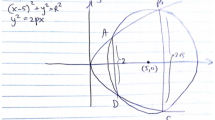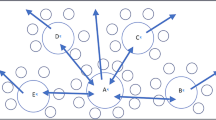Abstract
This paper reports a case study from a mathematics teaching developmental research project. The theoretical foundation for the research comprises communities of inquiry and critical alignment, with which the developmental methodology has a particular synergy. This synergy is the main focus of the paper. The paper elaborates theoretical and methodological antecedents of the project and traces these through a case study of developments in the practices of one upper secondary school team and a group of university didacticians (mathematics teacher educators and researchers) during the first year of the project. The case study reveals that critical alignment and inquiry (necessarily) bring uncertainty and risk, and foster tensions within the teachers’ practice and between the practices of teachers and didacticians. In exposing these uncertainties, risks and tensions, the paper points to their value for the learning and knowledge gained by participants.

Similar content being viewed by others
Notes
Learning Communities in Mathematics, project no. 157949/S20
References
Assude, T. (2005). Time management in the work economy of a class, a case study: Integration of Cabri in primary school mathematics teaching. Educational Studies in Mathematics, 59, 183–203.
Bjuland, R., Cestari, M. L., & Borgesen, H. E. (2008). The interplay between gesture and discourse as mediating devices in collaborative mathematical reasoning: A multimodal approach. Mathematical Thinking and Learning, 10(3), 271–292.
Bjuland, R., & Jaworski, B. (2009). Teachers’ perspectives on collaboration with didacticians to create an inquiry community. Research in Mathematics Education, 111(1), 21–38.
Brown, S., & McIntyre, D. (1993). Making sense of teaching. Buckingham, UK: Open University Press.
Cochran Smith, M., & Lytle, S. L. (1999). Relationships of knowledge and practice: Teacher learning in communities. Review of Research in Education, 24, 249–305.
Engeström, Y. (1994). Teachers as collaborative thinkers: Activity-theoretical study of an innovative teacher team. In I. Carlgren, G. Handal, & S. Vaage (Eds.), Teachers’ minds and actions: Research on teachers’ thinking and practice (pp. 43–61). London: Falmer.
Even, R. (2008). Facing the challenge of educating educators to work with practising mathematics teachers. In B. Jaworski & T. Wood (Eds.), The mathematics teacher educator as a developing professional. Volume 4 of the International handbook of mathematics teacher education (pp. 57–74). Rotterdam, The Netherlands: Sense Publishers.
Freudenthal, H. (1991). Revisiting mathematics education: China Lectures. Hingham, MA: Kluwer Academic Publishers.
Goodchild, S. (2008). A quest for ‘good’ research. In B. Jaworski & T. Wood (Eds.), International handbook of mathematics teacher education: Vol. 4. the mathematics teacher educator as a developing professional (pp. 201–220). Rotterdam, The Netherlands: Sense Publishers.
Gravemeijer, K. (1994). Educational development and developmental research in mathematics education. Journal for Research in Mathematics Education, 25, 443–471.
Jaworski, B. (1998). Mathematics teacher research: Process, practice and the development of teaching. Journal of Mathematics Teacher Education, 1, 3–31.
Jaworski, B. (2003). Research practice into/influencing mathematics teaching and learning development: Towards a theoretical framework based on co-learning partnerships. Educational Studies in Mathematics, 54(2–3), 249–282.
Jaworski, B. (2004). Insiders and outsiders in mathematics teaching development: The design and study of classroom activity. In O. MacNamara & R. Barwell (Eds.), Research in Mathematics Education: Papers of the British Society for Research into Learning Mathematics (Vol. 6, pp. 3–22). London: BSRLM.
Jaworski, B. (2006). Developmental research in mathematics teaching and learning: Developing learning communities based on inquiry and design. In P. Liljedahl (Ed.), Proceedings of the 2006 Annual Meeting of the Canadian Mathematics Education Study Group (pp. 3–16). Calgary, Canada: University of Calgary.
Jaworski, B. (2011). Mathematics teacher education in a global context. In N. Bednarz, D. Fiorentini, & R. Huang (Eds.), The professional development of mathematics teachers: Experiences and approaches developed in different countries (pp. 2–50). Ottawa, Canada: University of Ottawa Press.
Jaworski, B., Fuglestad, A. B., Bjuland, R., Breiteig, T., Goodchild, S., & Grevholm, B. (2007). Læringsfellesskap i matematikk—learning communities in mathematics. Bergen, Norway: Caspar Forlag AS.
Jaworski, B., Goodchild, S., Eriksen, S., & Daland, E. (2011). Mediating mathematics teaching development and pupils’ mathematical learning: The life cycle of a task. In O. Zaslavsky & P. Sullivan (Eds.), Constructing knowledge for teaching secondary mathematics: Tasks to enhance prospective and practicing teacher learning (pp. 143–160). London: Springer.
Jørgensen, K. O., & Goodchild, S. (2007). Å utvikle barns forståelse av matematikk. [To develop children’s understanding of mathematics.]. Tangenten, 18, 35–40. 49.
Llinares, S., & Krainer, K. (2006). Mathematics (student) teachers and teacher educators as learners. In A. Gutiérrez & P. Boero (Eds.), Handbook of research on the psychology of mathematics education: Past present and future (pp. 429–460). Rotterdam, The Netherlands: Sense Publishers.
Ollerton, M. (2002). Learning and teaching mathematics without a textbook. Derby, UK: Association of Teachers of Mathematics.
Schön, D. A. (1987). Educating the reflective practitioner. San Franscisco, CA: Jossey-Bass.
Skemp, R. (1976). Relational understanding and instrumental understanding. Mathematics Teaching, 77, 20–26.
Wagner, J. (1997). The unavoidable intervention of educational research: A framework for reconsidering researcher-practitioner cooperation. Educational Researcher, 26, 13–22.
Wells, G. (1999). Dialogic inquiry: Towards a sociocultural practice and theory of education. Cambridge, UK: Cambridge University Press.
Wenger, E. (1998). Communities of practice. Cambridge, UK: Cambridge University Press.
Zack, V., Mousley, J., & Breen, C. (Eds.). (1997). Developing practice: Teachers’ inquiry and educational change. Geelong, Australia: Centre for Studies in Mathematics, Science and Environmental Education, Deakin University.
Author information
Authors and Affiliations
Corresponding author
Appendix
Appendix
Rights and permissions
About this article
Cite this article
Goodchild, S., Fuglestad, A.B. & Jaworski, B. Critical alignment in inquiry-based practice in developing mathematics teaching. Educ Stud Math 84, 393–412 (2013). https://doi.org/10.1007/s10649-013-9489-z
Published:
Issue Date:
DOI: https://doi.org/10.1007/s10649-013-9489-z




